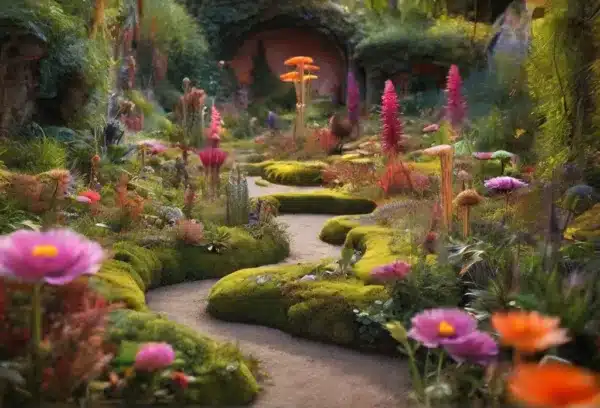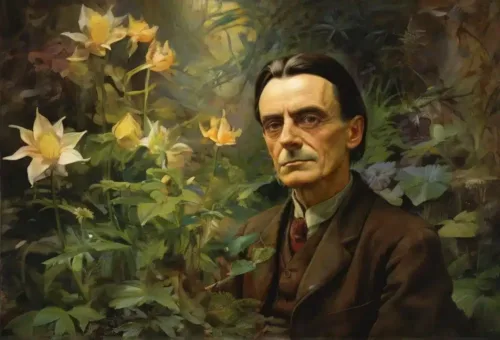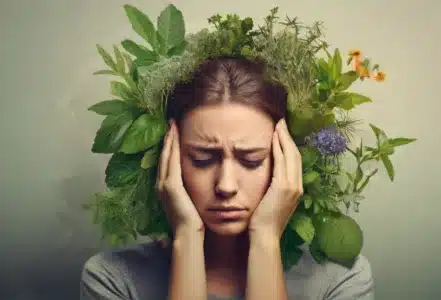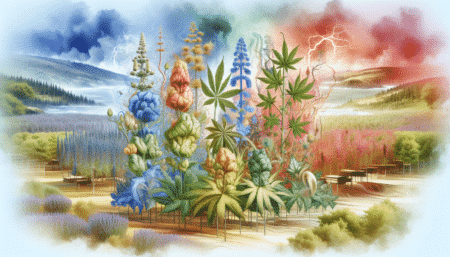- The importance of plants in anthroposophy
- The spiritual connection between humans and plants
- Antroposophical approaches to herbal medicine
- The importance of biodynamic cultivation in anthroposophy
- Antroposophical principles in the care of plants
- The use of plants in anthroposophic medicine
- Antroposophical rituals and ceremonies in connection with plants
- The significance of plant symbolism in anthroposophy
- Antroposophic nutrition and the role of plants
- Conclusion: The spiritual connection to plants in anthroposophy - a source of inspiration and healing
The mysterious roots of anthroposophy conceal a fascinating world of spiritual knowledge and human healing. Rudolf Steiner's visionary teachings have shaped anthroposophical medicine and created a bridge between science and spirituality. Immerse yourself in the anthroposophical world of healing and find out how this holistic medicine is touching more and more people in Germany and around the world. Discover the deep connection between man, nature and spirit and be inspired by the beauty of this spiritual medicine. Visit us at the Goetheanum and experience the transformative power of anthroposophic medicines and healing methods at first hand.
1 The importance of plants in anthroposophy
A central aspect of anthroposophy is the deep appreciation and importance of plants. Rudolf Steiner emphasized the essential role they play in the spiritual and physical development of human beings. Plants not only serve as food and remedies, but also embody spiritual principles and forces that connect us with the world. Through mindful contact with plants, we can deepen our own spirituality and develop a deeper connection to nature. In Germany and around the world, anthroposophical colleges and societies are finding ways to nurture and explore this connection. Anthroposophic medicine uses herbal medicines as holistic remedies that address body, mind and spirit. This holistic view also informs the ritual and symbolic practices of using plants in anthroposophy. Overall, anthroposophical approaches to the plant world show a profound recognition of their spiritual significance and influence on human existence.
2. the spiritual connection between humans and plants
In anthroposophical teaching, the spiritual connection between humans and plants is regarded as fundamental. Rudolf Steiner emphasized the importance of this relationship for the balance of body, mind and soul. By contemplating the plant world, we can gain deep insights into ourselves and develop a harmonious relationship with nature. Anthroposophical spiritual science teaches us that plants are not just external objects, but living entities with which we can connect. This connection enables us to experience healing and spiritual growth. In Germany, anthroposophical approaches to plant medicine and care are widespread and are valued by doctors and in society. The spiritual dimension of working with plants enriches our lives and opens us to the deeper rhythms of the world.
3. antroposophical approaches to herbal medicine
Anthroposophical herbal medicine focuses on holistic approaches. The use of plants as medicines is based on an understanding of the spiritual connection between man and nature. Rudolf Steiner emphasized the importance of viewing plants not only as material substances, but also as carriers of spiritual forces. Germany is a center for anthroposophical medicine and research in this field. Innovative methods of healing with plants are being researched at the anthroposophical college at the Goetheanum. Doctors and therapists worldwide rely on anthroposophical herbal medicine to pursue holistic treatment approaches. Through contact with the plant world, people can experience healing not only physically, but also mentally and spiritually. The anthroposophical society promotes an understanding of the healing power of nature and the importance of a harmonious relationship between humans and plants.
4. the importance of biodynamic cultivation in anthroposophy
Biodynamic cultivation plays a central role in anthroposophy. Rudolf Steiner, the founder of this spiritual science movement, emphasized the importance of harmonious interaction between man, nature and the cosmos. Biodynamic cultivation goes beyond purely ecological principles and views the farm as a living organism. Special preparations and cultivation methods are used to strengthen the vitality of the plants and promote their spiritual energy. The use of homeopathic medicines in cultivation underlines the holistic approach of anthroposophical agriculture. Numerous farms in Germany and around the world have committed themselves to this anthroposophical method of cultivation in order to cultivate a sustainable and spiritually fulfilling relationship with nature. Biodynamic cultivation in anthroposophy thus symbolizes a deep connection with the earth and its living beings.
5. antroposophical principles in the care of plants
The anthroposophical practice of plant care focuses on holistic principles. Each plant is seen as an individual being that deserves respect and attention. Careful consideration of the location, the care requirements and the time for sowing or harvesting are of central importance. By incorporating cosmic influences and considering the plants in the context of the whole ecosystem, a harmonious relationship is promoted. Antroposophic gardeners strive to work in harmony with natural rhythms and thus strengthen the vitality and healing power of plants. This mindful approach reflects a deep understanding of the connection between humans and nature and helps to promote health and well-being at all levels.

6 The use of plants in anthroposophic medicine
Plants play a central role as remedies in anthroposophical medicine. Rudolf Steiner emphasized the importance of nature for human health. Herbal medicines are valued for their holistic effect and are used in the treatment of many diseases. They are produced according to special procedures in order to preserve their life forces. Anthroposophic medicine considers the human being as a whole and uses plants to strengthen body, mind and soul. Through the use of plant essences, teas or tinctures, the energetic balance in the organism is sought. These gentle healing methods promote self-healing powers and support people on their path to recovery. In anthroposophical medicine, the connection between plants and humans is regarded as healing and profound, as it not only treats physical complaints but also takes spiritual aspects into account.
7. antroposophical rituals and ceremonies in connection with plants
Shrouded in mysterious traditions and deep connection, antroposophical rituals and ceremonies play an important role in the context of the plant world. Through these celebrated acts, not only is the external beauty of nature honored, but its spiritual essence is also made tangible. In Germany and around the world, people come together to establish a direct connection to the spiritual world and plants through ritual practices. These ceremonies, inspired by the teachings of Rudolf Steiner, serve to enhance the healing power of plants and raise awareness of their importance in our society. By participating in these anthroposophical rituals, a profound relationship with nature is fostered, which not only supports individual healing but also strengthens collective well-being.
8 The significance of plant symbolism in anthroposophy
In the anthroposophical world view, plants not only play a physical role, but also carry deep symbolic meanings. Each plant is seen as an expression of a spiritual principle that is connected to the human being. For example, roses represent love and beauty, while oaks stand for strength and constancy. This symbolism is not only reflected in the art and architecture of the Goetheanum, but also permeates anthroposophical medicine and nutrition. Plant symbolism is used to describe spiritual qualities and establish a connection between humans and nature. By understanding these symbols, people can develop a deeper spiritual relationship with plants and experience their healing power on a deeper level.
9. antroposophical nutrition and the role of plants
The role of plants plays a central role in anthroposophical nutrition. Rudolf Steiner emphasized the connection between man and nature as essential for spiritual well-being. Anthroposophical nutrition is based on the understanding that food should not only nourish the body, but also the soul. Plants are seen as living beings with which humans can come into contact in order to gain spiritual insights. This holistic view also characterizes the preparation of food, where attention is paid to biodynamic cultivation methods. In Germany and around the world, more and more people are taking a liking to anthroposophical nutrition, which is not only beneficial to health, but also promotes a conscious engagement with nature and its gifts. By consciously using plants in our diet, we can support not only our bodies but also our spiritual development.
10 Conclusion: The spiritual connection to plants in anthroposophy - a source of inspiration and healing
In anthroposophy, the spiritual connection to plants is seen as a deep source of inspiration and healing. Rudolf Steiner emphasized the importance of this relationship for the well-being of man and nature. Anthroposophical approaches to herbal medicine apply holistic healing methods that take into account both physical and spiritual aspects. The biodynamic cultivation of plants according to anthroposophical principles not only promotes the quality of the produce, but also harmony with the environment. The use of plants in anthroposophical medicine is based on an understanding of the spiritual forces at work within them. Rituals and ceremonies involving plants play an important role in anthroposophical society. The symbolism of plants is researched in depth and used in various areas of life, including nutrition. Overall, in anthroposophy, plants are not only food and medicine, but also guides to spiritual knowledge and healing.
Further questions and answers on antroposophy
What is anthroposophy in a nutshell?
Anthroposophy is a spiritual philosophy developed by Rudolf Steiner. It is based on the idea that there is a hidden reality that goes beyond the senses. Anthroposophy views the human being as a being with a spiritual dimension that can develop through education, art and science. Central concepts are the idea of reincarnation and karma as well as the idea of a hidden world order. Anthroposophy is applied in various areas, such as Waldorf education, biodynamic agriculture and anthroposophical medicine. However, critics complain that it lacks scientific evidence and is considered esoteric. Nevertheless, anthroposophy has an international following and continues to influence areas such as art, education and medicine.
What do anthroposophists believe?
Anthroposophists believe in the spiritual dimension of human beings and the world. They believe in the existence of a spiritual world that transcends physical reality. Rudolf Steiner, the founder of anthroposophy, taught that human beings have a tripartite nature consisting of body, soul and spirit. Anthroposophists believe in the re-embodiment of the soul and in the evolution of human consciousness. They strive to create a harmonious connection between the physical and spiritual being. Central to their belief is also the idea of "anthroposophy", the wisdom of the human being, which makes it possible to recognize the hidden connections between the human being and the cosmos. Anthroposophists practise eurythmy, biodynamic agriculture and anthroposophic medicine, among other things, as ways to develop spiritually and heal body, mind and soul.
What do anthroposophists think?
Anthroposophists believe in the spiritual development of human beings through knowledge and self-education. They are followers of anthroposophy, an esoteric doctrine founded by Rudolf Steiner. Anthroposophists see the world as a complex system of spiritual and physical forces that are interconnected. They strive to develop a deeper understanding of the spiritual dimensions of life and to advance their own spiritual development. Anthroposophy encompasses topics such as reincarnation, karma, and the existence of spiritual entities. Anthroposophists are committed to a holistic education that promotes creativity, individuality and social responsibility. They are also involved in various fields such as agriculture, medicine and art, integrating spiritual principles into their work. Overall, anthroposophists strive to create a harmonious connection between spirit and matter and to support the spiritual evolution of human beings.
What does anthroposophy say?
Anthroposophy is a spiritual-scientific worldview that was developed by Rudolf Steiner. It views the human being as a being with a material body, a soul and a spiritual part. Anthroposophists believe in the existence of a spiritual world and the possibility of spiritual knowledge. They strive to deepen the connection between human beings and the spiritual world and to develop their own individuality. Anthroposophy encompasses various areas such as art, education, agriculture and medicine, which are based on anthroposophical principles. Central to this is the pursuit of a holistic view of human beings and their relationship to the world. However, critics of anthroposophy often criticize its esoteric and mystical elements as well as its lack of scientific foundation. Nevertheless, anthroposophy continues to exert an influence on various areas of society to this day.
















